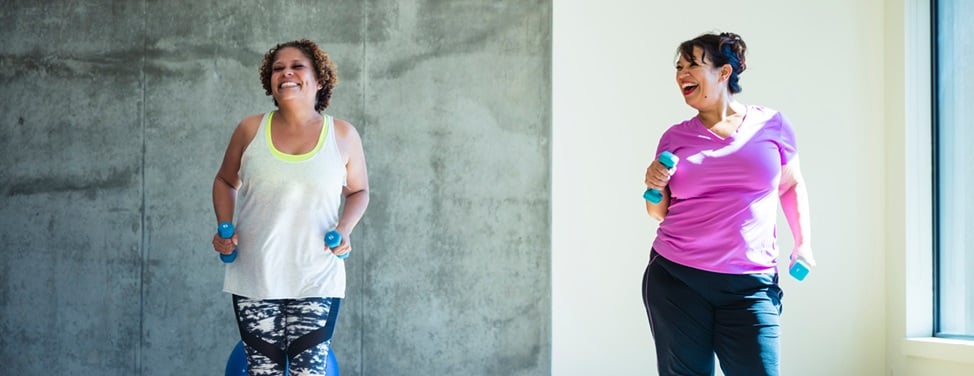
Menopause and Breast Cancer
Breast cancer treatment often causes women to enter menopause prematurely. The change in hormone levels and estrogen depletion caused by stopping hormone replacement therapy or undergoing chemotherapy or hormonal therapy can trigger side effects commonly associated with menopause.
Although each woman reacts to therapy individually, certain side effects are common. We hope this information will provide you with useful tips to help you manage any side effects that you may be experiencing.
Before implementing these management strategies, please discuss your specific symptoms with your physician or nurse and ask any questions you may have. If you are seeing a complementary or alternative medicine practitioner, please let us know what you are using so we can incorporate the information into your care plan.
Hot flashes
Hot flashes are probably the most common side effect of menopause. Triggers include spicy foods, caffeine, alcohol, tight clothing, heat and stress. Try to avoid these things as best you can if your hot flashes are bothersome.
Foods, like soy products (soymilk, tofu, soynuts) and flaxseeds (either ground or in oil form) have been shown to reduce hot flashes in some women. Experiment with these in your diet if possible. We have helpful written materials on soy products and how to incorporate them into your diet.
Hot flashes tend to be worse at night, but a few simple things can make you more comfortable:
- Wear cotton pajamas and sleep with a fan on in a cool room
- Use cotton flannel or "T-shirt" sheets to absorb moisture
- Keep a change of sheets and pajamas close to your bed so that you can change them quickly if they are wet from perspiration
- Take a warm bath or shower before bed
The relaxation response, which includes deep abdominal breathing, has been shown to have many beneficial health effects, including minimizing hot flashes. It will help you stay calm and possibly avoid or reduce the severity of a hot flash. Try to take long, slow, deep breaths, seven to eight breaths per minute if possible, when you feel a hot flash coming on. Continue to do so for 15 minutes.
Daily exercise may also reduce hot flashes. Aerobic exercise for at least 20 to 30 minutes a day, at least three times a week is our recommendation. Aerobic exercise includes walking, running, swimming, biking or any other exercise that keeps your heart rate elevated for an extended time period.
We have an information sheet describing aerobic exercise that will be helpful for you. If you do not have a regular exercise program already, please consult with your physician or nurse to see what type of exercises may be best for you.
There are prescription medications that provide a benefit to some women. A current example is venlafaxine (Effexor). This medication is an antidepressant and in low doses, also can decrease the frequency and severity of hot flashes.
Sleep disturbances
Hot flashes can interrupt a healthy night sleep, and insomnia is common. Some tips to help you avoid insomnia include:
- Only go to bed when you are tired.
- Only sleep while in bed. Do not read, eat or watch television.
- Get up at the same time every day despite not having had a good night's sleep.
- If you cannot fall asleep, do not stay in bed longer than 15 minutes, but instead get up, go into another room and only go back to bed when you are tired.
- Try to avoid sleeping pills if possible, but if necessary be sure to follow the directions.
- Avoid caffeinated foods like coffee, cola, and chocolate especially at nighttime.
- Avoid nicotine and alcohol especially at nighttime.
- Regular exercise is helpful.
Sexual difficulties
A lack of estrogen and testosterone can cause many side effects that interfere with sexual desire and function. A decreased libido (or sex drive) is common and many authors say this may be related to decreases in estrogen and testosterone levels.
Vaginal dryness often causes discomfort and irritation, vaginal discharge or infection and pain during sexual intercourse. Try using a non-prescription, water-based vaginal lubricant like Astroglide or K-Y Jelly to reduce pain during intercourse. Oil-based lubricants like Vaseline are not recommended. Over the counter products with scents, alcohol or other additives should also be avoided. Replens is a vaginal moisturizer that can help with dryness as well.
Talk with your doctor or nurse if you have questions about how to use these products. You may want to discuss products requiring a prescription — for example a topical ointment containing low dose testosterone or very low dose estrogen products — with your physician as well.
We have an informative sheet on "Sexuality and Cancer" which is a good resource. The booklet "Sexuality and Cancer: For the Woman Who Has Cancer and Her Partner," by the American Cancer Society, is an excellent source of information as well.
Anxiety and mood changes
Exercise, again, will help to stabilize your mood changes and reduce anxiety. If you have difficulty doing 20 to 30 minutes of aerobic exercise, three times a week, then begin with what you are comfortable with and try to increase your exercise program when you are ready.
Invoking the relaxation response by using deep abdominal breathing will also help you to relax, reduce anxiety and stabilize mood changes.
Talking with a professional also is recommended.
Memory problems
Difficulty with memory is common in mid-life, but especially during menopause. Tools to help you compensate for any memory challenges you may be experiencing include:
- Making to-do lists
- Keeping a detailed calendar
- Having designated places for important things like keys, wallets and glasses
- Leaving a reminder at your door to check the stove and other appliances to make sure they are turned off
- Maintaining good nutrition and hydration
- Keeping your brain active by reading and conversing with others
Preventing osteoporosis
Osteoporosis is a risk for all women as they age. However, women with breast cancer must be especially cautious, because most doctors advise they avoid taking additional hormones that help prevent osteoporosis.
Certain drugs like alendronate (Fosamax), calcitonin and raloxifene (Evista) can help increase calcium levels. These drugs might be appropriate for you, but should be discussed with your physician. Finally, maintaining a healthy diet and getting regular exercise helps prevent fractures and maintain bone strength.
UCSF Health medical specialists have reviewed this information. It is for educational purposes only and is not intended to replace the advice of your doctor or other health care provider. We encourage you to discuss any questions or concerns you may have with your provider.

















